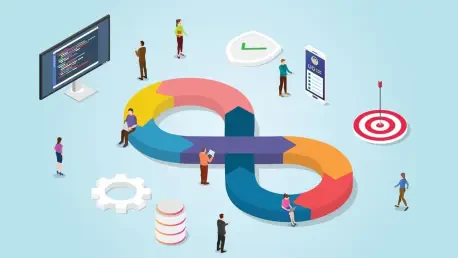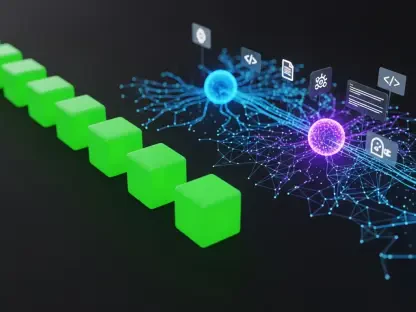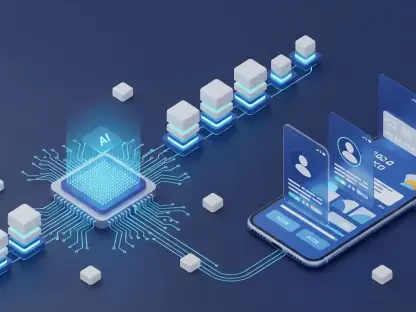In an era where software development cycles are shrinking under relentless pressure for speed and efficiency, a staggering statistic emerges: over 70% of DevOps professionals report that manual processes still consume a significant portion of their time, hindering innovation. This bottleneck in automation has pushed the industry to seek transformative solutions, with artificial intelligence stepping into the spotlight as a game-changer. Tabnine, a prominent player in AI-driven coding platforms, has recently introduced a groundbreaking advancement with AI agents designed to revolutionize DevOps workflows through autonomous task handling. This development signals a pivotal shift toward automation, promising to alleviate the burdens of repetitive tasks and accelerate delivery timelines.
The Rise of AI in DevOps: Setting the Stage
The integration of AI into DevOps practices has gained remarkable traction, reshaping how software development and operations teams collaborate. With the demand for faster deployments and higher-quality code intensifying, AI tools have become indispensable in optimizing processes such as continuous integration and delivery. These technologies are no longer just supplementary; they are central to maintaining competitive edges in an industry driven by rapid innovation.
Among the key players, Tabnine stands out with its focus on enhancing productivity through intelligent automation. Other emerging technologies, including AI-driven testing frameworks and predictive analytics for deployment risks, are also gaining ground. The broader trend points toward a future where manual intervention in DevOps workflows diminishes, replaced by sophisticated systems capable of self-managing complex tasks. This shift underscores a growing reliance on AI to handle the intricacies of modern software environments.
The momentum behind AI adoption in DevOps reflects a fundamental transformation in development philosophies. Automation is no longer a luxury but a necessity to address scaling challenges and resource constraints. As platforms evolve, the industry watches closely to see how these tools will redefine efficiency standards, setting a new benchmark for what teams can achieve with limited human input.
Tabnine’s Innovation: AI Agents and the Context Engine
Transforming Workflows with Agentic AI
Tabnine’s latest stride into what it calls the “agentic AI era” marks a significant departure from traditional code suggestion tools. These newly introduced AI agents are engineered to autonomously execute multi-step tasks, such as refactoring codebases, debugging intricate issues, and generating comprehensive documentation. Unlike earlier iterations that merely offered snippets or autocomplete features, these agents operate with a deeper understanding of project contexts, making them powerful allies in complex DevOps environments.
The impact on DevOps processes is profound, as these agents can independently navigate through workflows that once required extensive human oversight. By automating repetitive and time-intensive activities, they allow teams to focus on strategic initiatives rather than operational minutiae. This capability is particularly beneficial in high-pressure settings where deadlines loom large, offering a lifeline to overstretched developers.
Furthermore, the transition to agentic AI signifies a broader industry pivot toward self-sufficient systems. Tabnine’s approach reduces the cognitive load on DevOps professionals, enabling them to tackle higher-level problem-solving. This evolution hints at a future where the line between human and machine contributions in software development becomes increasingly blurred, raising exciting possibilities for productivity gains.
Flexibility and Adaptability of the Context Engine
At the heart of Tabnine’s innovation lies its Context Engine, a sophisticated framework that empowers AI agents to reason across diverse code repositories, integrated tools, and organizational policies without the need for retraining or redeployment. This adaptability ensures that the platform remains agile, seamlessly adjusting to shifts in development environments or updates in underlying technologies. Such flexibility is crucial in a landscape where change is the only constant.
A distinguishing feature of this engine is its agnostic stance on large language models (LLMs). Rather than tying users to a specific model, Tabnine allows DevOps teams to connect with their preferred LLMs, fostering a customizable experience. Coupled with a transparent pricing structure based on flat monthly fees and usage-based costs, including pass-through billing for LLM access, the platform prioritizes clarity and fairness in its financial model.
This design philosophy not only enhances user control but also mitigates the risk of vendor lock-in, a common concern in tech adoption. By empowering teams to tailor the tool to their unique needs, Tabnine ensures that its solution remains relevant across varied organizational contexts. The Context Engine thus stands as a testament to thoughtful engineering, balancing innovation with practicality in addressing real-world DevOps challenges.
Challenges in AI-Driven DevOps Automation
The integration of AI into DevOps, while promising, is not without significant hurdles. One pressing issue is the accumulation of technical debt resulting from the sheer volume of code generated by AI agents. Without stringent review mechanisms, this rapid output can lead to unwieldy codebases that are difficult to maintain, ultimately undermining the very efficiency these tools aim to deliver.
Another critical concern revolves around the risk of sensitive data exposure within AI-generated outputs. As these agents process vast amounts of information, there is a potential for proprietary or personal data to be inadvertently included in suggestions or documentation. This vulnerability necessitates robust safeguards to protect organizational assets and maintain trust in automated systems.
Addressing these challenges requires a proactive approach to oversight. DevOps teams must implement strict monitoring protocols to manage the quality and security of AI contributions. The industry faces a delicate balancing act: harnessing the power of automation while preventing it from becoming a liability. These obstacles highlight the need for continuous refinement in how AI tools are deployed and managed within development pipelines.
Governance and Compliance in AI Coding Platforms
Recognizing the importance of control in AI-driven environments, Tabnine has embedded centralized governance features within its Context Engine. These controls enable organizations to enforce permissions, define usage policies, and adhere to regulatory compliance requirements. Such mechanisms are essential for ensuring that AI agents operate within defined boundaries, preventing misuse or overreach in sensitive areas.
Auditing capabilities further bolster this framework, providing transparency into how AI tools interact with data and workflows. By allowing teams to track and review agent activities, Tabnine facilitates accountability, a critical factor in meeting industry standards and legal mandates. This focus on oversight helps mitigate risks associated with unchecked automation, fostering a secure operational environment.
Additionally, managing data access limits by team or business unit is a key component of Tabnine’s governance strategy. This granular control ensures that only authorized personnel interact with specific datasets, safeguarding against potential breaches. As AI becomes more pervasive in DevOps, such measures are vital for maintaining integrity and trust, reinforcing the need for platforms to prioritize security alongside innovation.
The Future of AI in the Software Development Lifecycle
The trajectory of AI in software development points to an inevitable embedding across every phase of the software development lifecycle (SDLC). From initial planning and coding to testing and deployment, AI’s transformative potential is poised to redefine traditional methodologies. This integration promises to streamline operations, reduce errors, and accelerate time-to-market for products in increasingly competitive sectors.
However, as AI agents gain enhanced reasoning capabilities through expanded memory access, their data consumption is likely to surge. This trend raises concerns about resource allocation and the potential for unintended data exposure. Managing these aspects will be crucial to prevent operational inefficiencies or security lapses, pushing the industry to develop more sophisticated monitoring tools over the coming years.
Looking ahead, evolving governance frameworks will play a pivotal role in shaping AI’s role in SDLC. Between now and 2027, expect a heightened focus on creating policies that balance innovation with accountability. The challenge lies in anticipating the needs of a rapidly advancing technology landscape while ensuring that ethical and practical considerations remain at the forefront of adoption strategies.
Conclusion: Balancing Innovation and Responsibility
Reflecting on Tabnine’s advancements, it is evident that their introduction of AI agents marks a significant leap in automating DevOps workflows, offering teams unprecedented efficiency through intelligent automation. The Context Engine stands as a cornerstone of this progress, providing adaptability and governance that address many contemporary challenges in software development.
Moving forward, the industry needs to prioritize the establishment of robust oversight mechanisms to manage the risks associated with AI, such as technical debt and data security. A concerted effort to refine governance models is essential, ensuring that policies keep pace with technological advancements. Additionally, fostering collaboration between developers and AI tools promises to unlock further potential, provided that cost controls and ethical guidelines are firmly in place.
Ultimately, the path ahead requires a commitment to balancing innovation with responsibility. By investing in training for DevOps teams to effectively leverage AI agents and by advocating for transparent data usage practices, organizations can navigate the complexities of this transformative era. Tabnine’s contributions lay a strong foundation, but sustained vigilance and adaptation are imperative to shape a future where automation enhances, rather than encumbers, software development.









